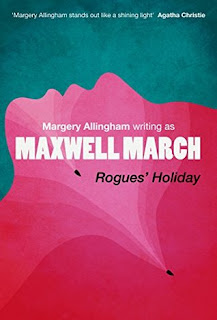Rating: 2/5
Review:
Unworthy of Allingham's name
Rogue's Holiday was written by
Margery Allingham under a pseudonym to be serialised as a potboiler because she
needed the income before her Campion novels began to make sufficient
money. I'm afraid it shows, because
there is none of Allingham's later brilliant wit, subtle characterisation or
skilful plot development here. It's a
clunky, hackneyed book which I got very fed up with.
The story is of David Blest, a brilliant, handsome young Scotland
Yard inspector who, unhappy with the investigation of a death in a Gentleman's
Club, takes a couple of weeks' leave on the south coast at the hotel where the
man he suspects is staying. A frankly,
silly plot develops: Blest takes less than a day to fall hopelessly in love
with a young woman at the hotel, who is not All She Seems. Naturally, it turns out that the entire
business revolves around her, with murder, kidnapping, eccentric wills,
sinister outsiders and so on all making their due appearance. The clichés, remarkable coincidences and
unconvincing characters continue to mount, culminating in Blest making a Dangerous
Last Minute Dash to save his beloved from the clutches of the Evil Enemy. (I
obviously wouldn't dream of spoiling the ending by revealing whether he
succeeds.)
I read this because I love Margery Allingham's Campion
series, which are fine, superbly written novels. However, by about half way through Rogue's Holiday
I had muttered, "Oh, for heavens' sake" (I paraphrase) so many times
that I began to skim, and really didn't feel I was missing much. I suppose it's right that a book from
Allingham's pen should be published, but it's pretty poor and really doesn't do
any favours to a genuine great of the genre.
My advice: avoid this and stick to Campion.
(I received an ARC via Netgalley.)












